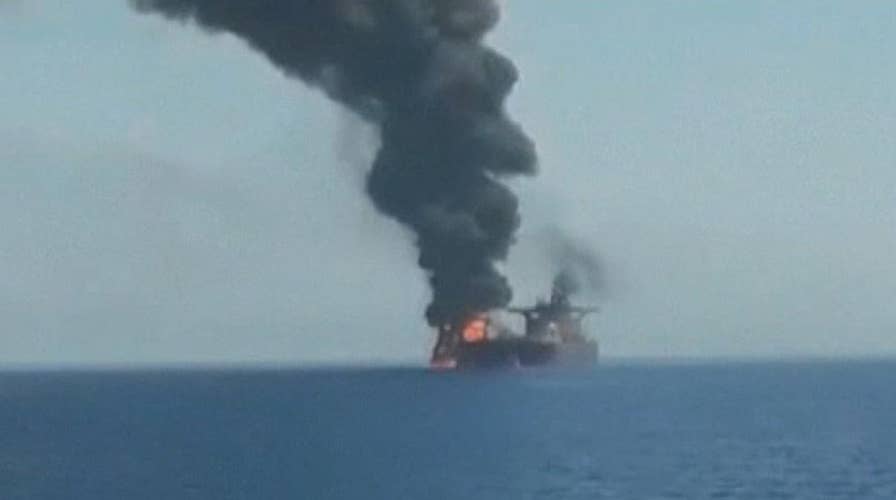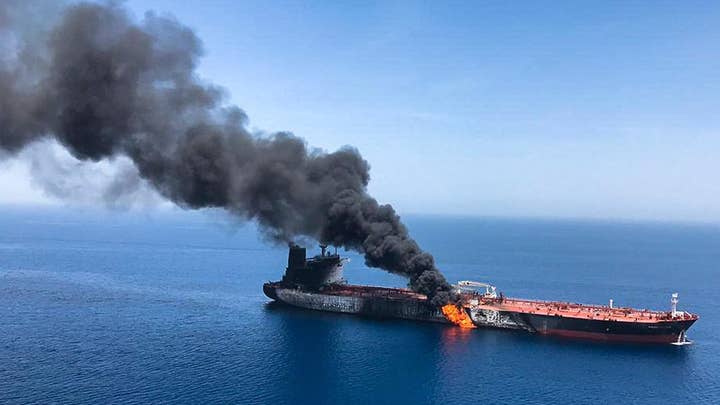Oil tanker damaged in suspected attack burns in the Gulf of Oman
Raw video: Oil tanker burns in the Gulf of Oman off the coast of Iran. Officials suspect the tanker was damaged in a torpedo attack.
Two oil tankers were damaged in a suspected attack off the Gulf of Oman early Thursday, prompting the rescue of dozens of crew members.
The U.S. Navy's Bahrain-based Fifth Fleet said it was assisting two tankers in the Gulf of Oman after receiving two distress calls. Details of the incident were unclear, but one of the operators made an unconfirmed report that a torpedo had hit its ship.
Dramatic images and video of the Altair were subsequently released by Iranian state media.
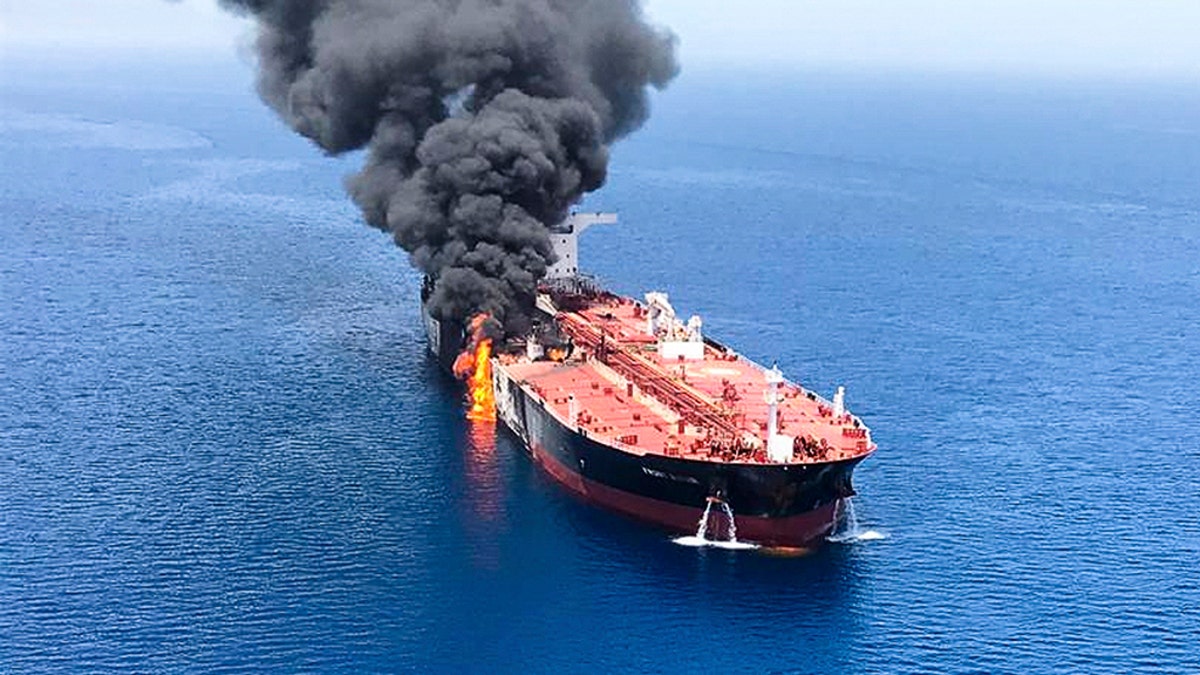
An oil tanker is on fire in the sea of Oman, Thursday, June 13, 2019. Two oil tankers near the strategic Strait of Hormuz were reportedly attacked on Thursday, an assault that left one ablaze and adrift as sailors were evacuated from both vessels and the U.S. Navy rushed to assist amid heightened tensions between Washington and Tehran. (AP/ISNA)
International Tanker Management, which operates the MT Front Altair said an explosion had caused a fire onboard. The firm told the Associated Press the incident is still being investigated and it was unclear what caused the explosion. Its 23 crew members were evacuated by the nearby South Korean-based Hyundai Dubai Vessel and are now safe, the firm said.
Iran's Islamic Republic News Agency, IRNA, claimed the Front Altair had sunk, but the Norwegian shipping firm Frontline said it was still afloat.
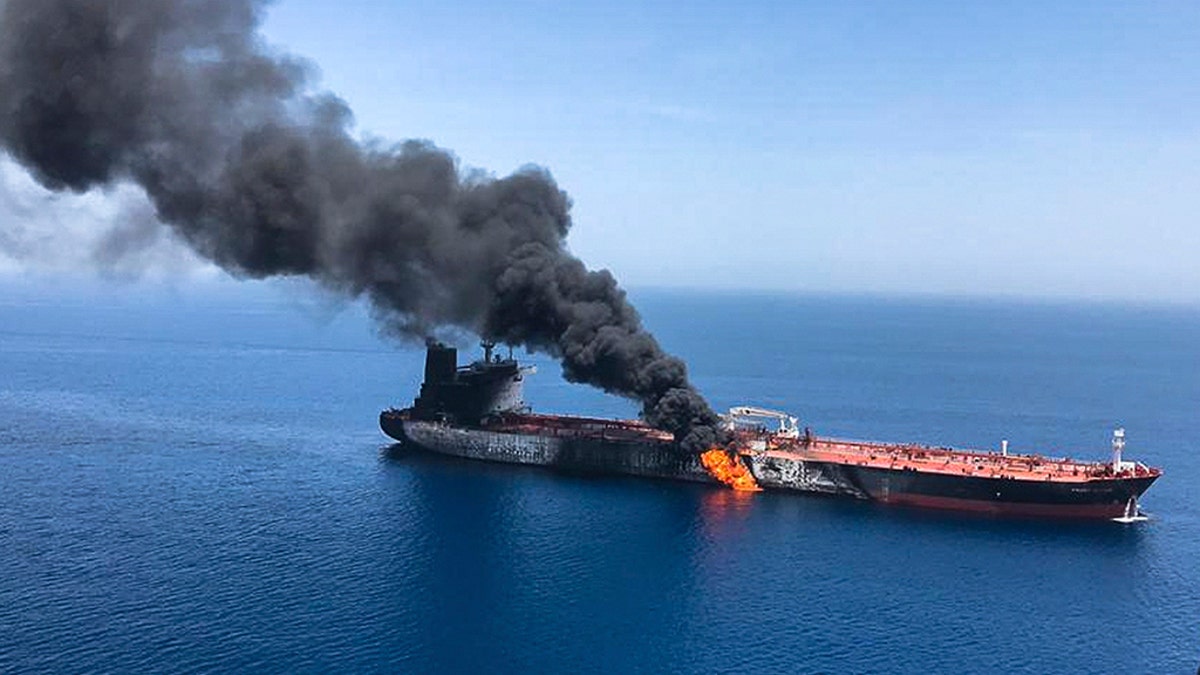
An oil tanker is on fire in the sea of Oman, Thursday, June 13, 2019. Two oil tankers near the strategic Strait of Hormuz were reportedly attacked on Thursday, an assault that left one ablaze and adrift as sailors were evacuated from both vessels and the U.S. Navy rushed to assist amid heightened tensions between Washington and Tehran. (AP/ISNA)
The other vessel, the Panama-flagged, Japanese-owned Kokuka Courageous, reportedly carrying methanol, sustained damage on its hull starboard side. 21 sailors were evacuated, and one was slightly injured.
Lieutenant Colonel Earl Brown, a CENTCOM spokesman, told Fox News: "U.S. Naval Forces in the region received two separate distress calls at 6:12 a.m. local time and a second one at 7:00 a.m.
JAPANESE PRIME MINISTER AND TRUMP ALLY SHINZO ABE VISITS TEHRAN TO HELP EASE US-IRAN TENSIONS
"U.S. Naval Forces Central Command received the calls from the M/V Front Altair and M/V Kokuka Courageous, who were operating in international waters of the Gulf of Oman.
"USS Bainbridge (DDG 96) was operating in the vicinity and provided immediate assistance to the M/V Kokuka Courageous.
"Twenty-one mariners from the M/V Kokuka Courageous, who abandoned ship, are currently aboard USS Bainbridge. A Navy P-8 is also providing support."
One of the vessels involved was identified as the MT Front Altair, a Marshall Islands-flagged but Norwegian-owned crude oil tanker carrying naphtha, a petrochemical product, to Japan.
The United Kingdom Maritime Trade Operations -- an arm of the British Navy -- had put out an alert earlier and urged "extreme caution" amid U.S.-Iran tensions.
Mohammad Javad Zarif, Iran's foreign minister, called for regional talks, and said of the incident: "Suspicious doesn't begin to describe what likely transpired this morning."
His comments came as Ayatollah Khamenei was meeting Shinzo Abe, Japan's prime minister, for talks in Iran.
The area of the explosions is near the Strait of Hormuz, a strategic route through which 20 percent of global oil consumption passes from Middle East producers. Oil prices rose by about 4 percent in the wake of the latest incidents, while the tanker association INTERTANKO said that there were growing worries for the safety of ships sailing through the strait.
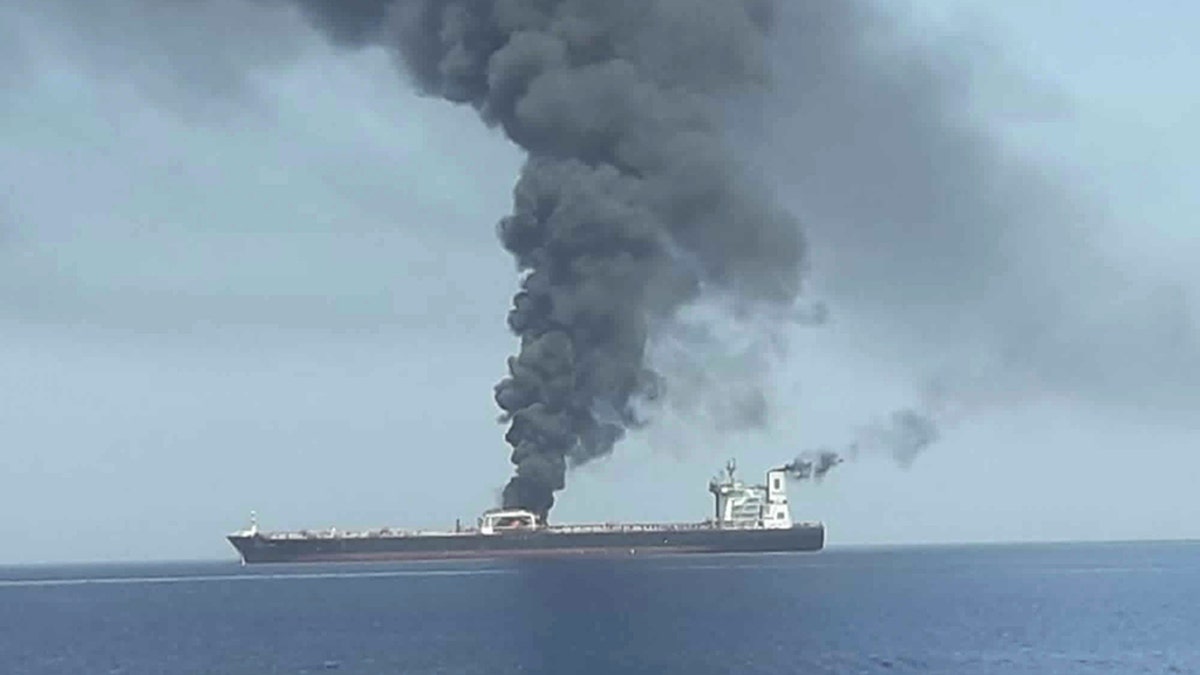
In this photo released by state-run IRIB News Agency, an oil tanker is on fire in the sea of Oman, Thursday, June 13, 2019. Two oil tankers near the strategic Strait of Hormuz have been reportedly attacked. The alleged assault on Thursday left one ablaze and adrift as sailors were evacuated from both vessels. The U.S. Navy rushed to assist amid heightened tensions between Washington and Tehran. (IRIB News Agency via AP)
"Following two attacks on Member vessels this morning, I am extremely worried about the safety of our crews going through the Strait of Hormuz," Paolo d’Amico, chairman of INTERTANKO, said in a statement.
"We need to remember that some 30% of the world’s (seaborne) crude oil passes through the Straits. If the waters are becoming unsafe, the supply to the entire Western world could be at risk."
26 WOUNDED IN MISSILE ATTACK BY HOUTHI REBELS AT SAUDI AIRPORT: REPORT
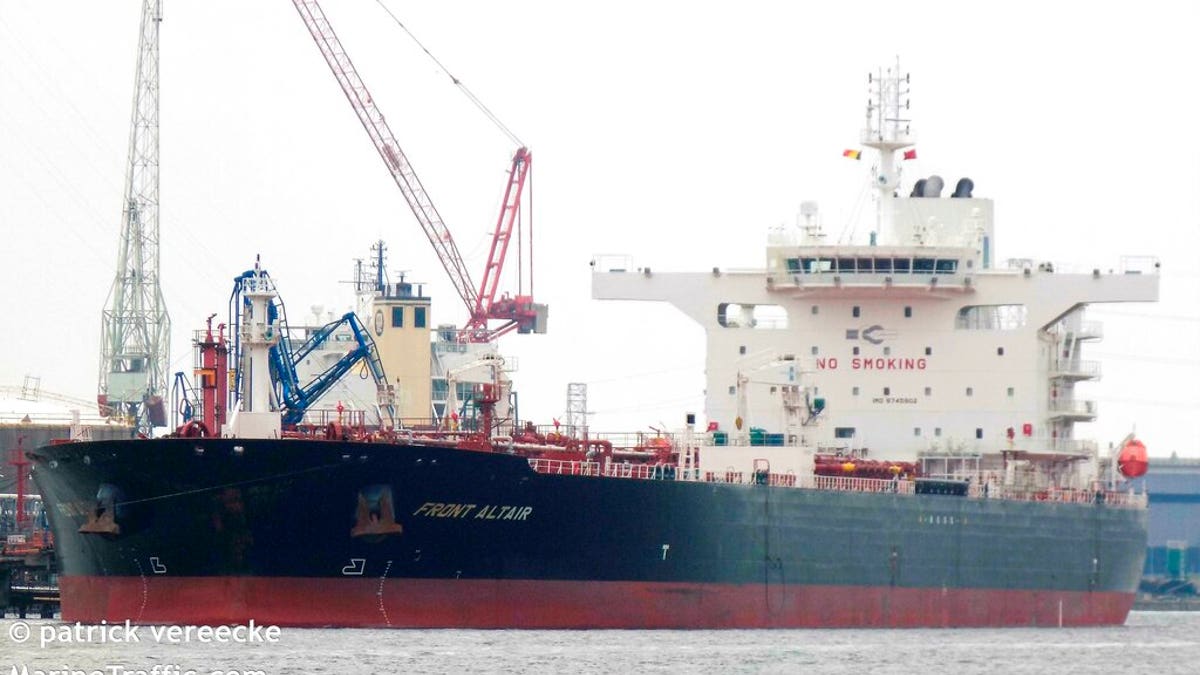
This May 2018 image made available by Marine Traffic shows the MT Front Altair in Antwerp, Belgium. (Patrick Vereecke/Marine Traffic via AP)
UAE ACCUSES 'STATE ACTOR' FOR TANK ATTACKS, BUT STOPS JUST SHORT OF IRAN
Thursday's incident comes a month after the U.S. accused Iran of attacking ships off the coast of United Arab Emirates. The UAE told the U.N. Security Council a "state actor" was most likely behind the attacks but stopped short of blaming Iran.
The timing of Thursday's incident was especially sensitive as Japanese Prime Minister Shinzo Abe was visiting Iran as an interlocutor for President Donald Trump to ease tensions between Washington and Tehran.
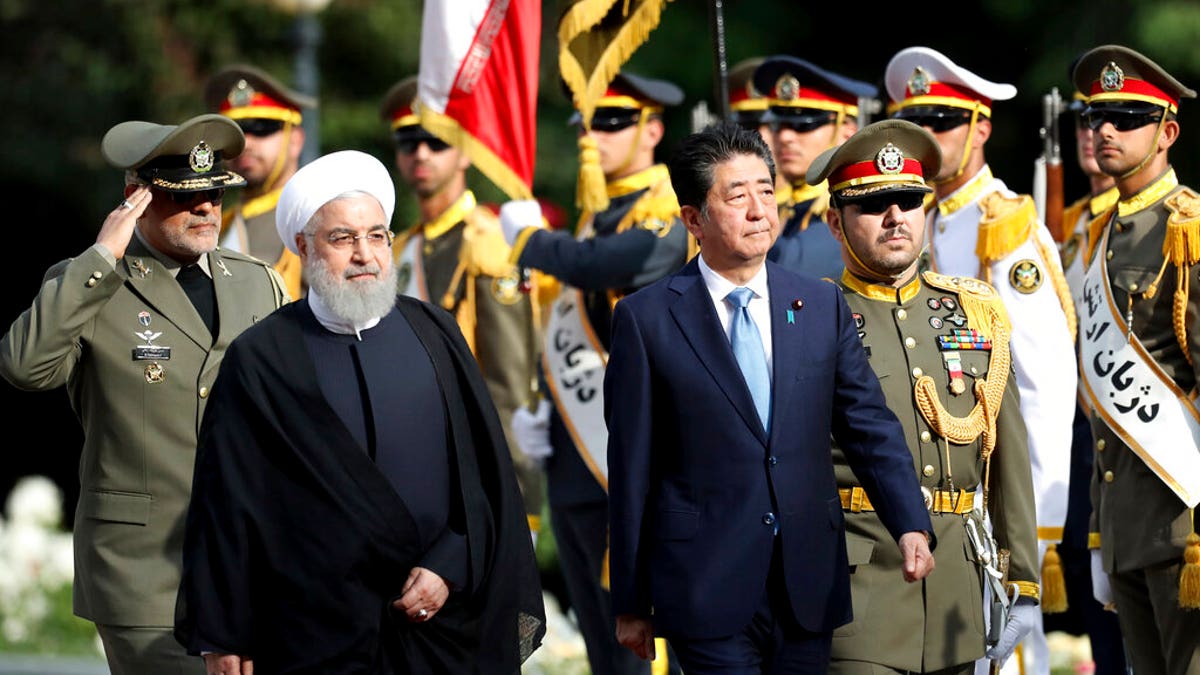
Japanese Prime Minister Shinzo Abe, center, reviews an honor guard as he is welcomed by Iranian President Hassan Rouhani, left, in an official arrival ceremony at the Saadabad Palace in Tehran. (AP)
On Wednesday, after talks with Iranian President Hassan Rouhani, Abe warned that any "accidental conflict" amid heightened tensions between Iran and the U.S. must be avoided at all costs.
While meeting with Abe on Thursday, Iran's Supreme Leader Ayatollah Ali Khamenei said that while Tehran doesn't want an atomic bomb, "America could not do anything" to stop Iran if it did.
Khamenei was quoted earlier saying that Iran "will in no way repeat" negotiations with the U.S. amid tension over its unraveling nuclear deal with world powers.
Khamenei's official website quoted him as telling Abe: "I don't regard Trump as deserving any exchange of messages and have no response for him and will give no response."
Fox News' Lucas Tomlinson and Chris Irvine contributed to this report.
The Associated Press contributed to this report.








































